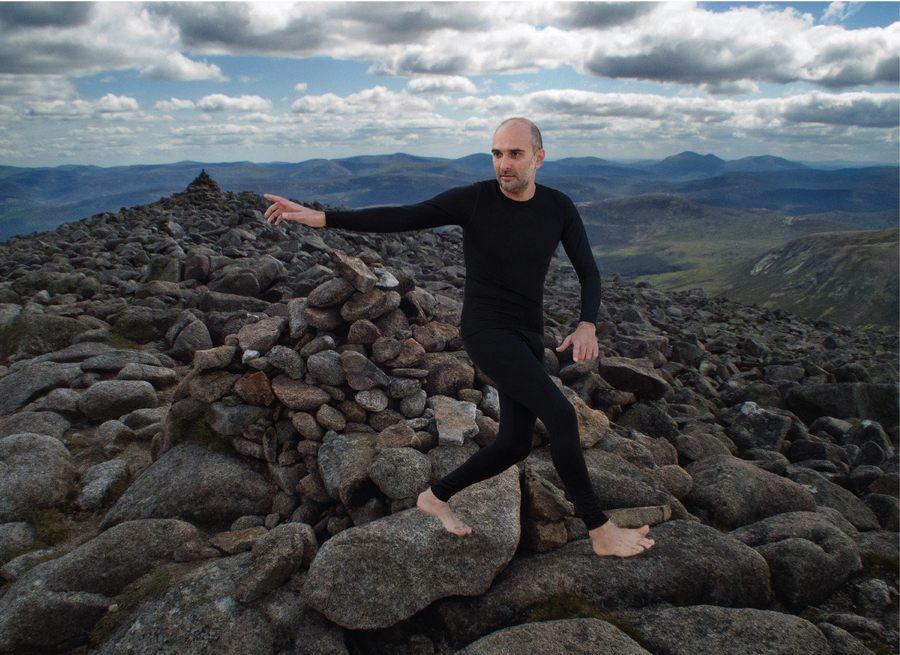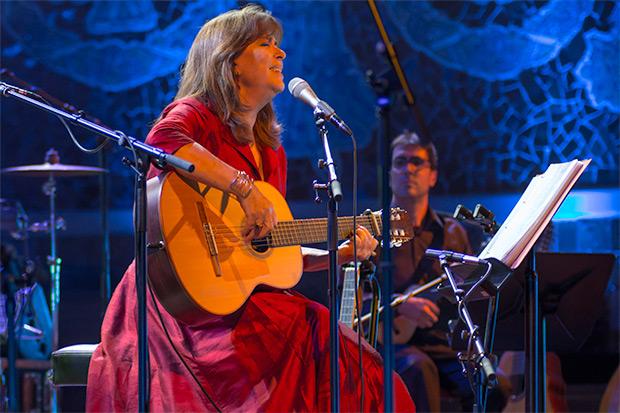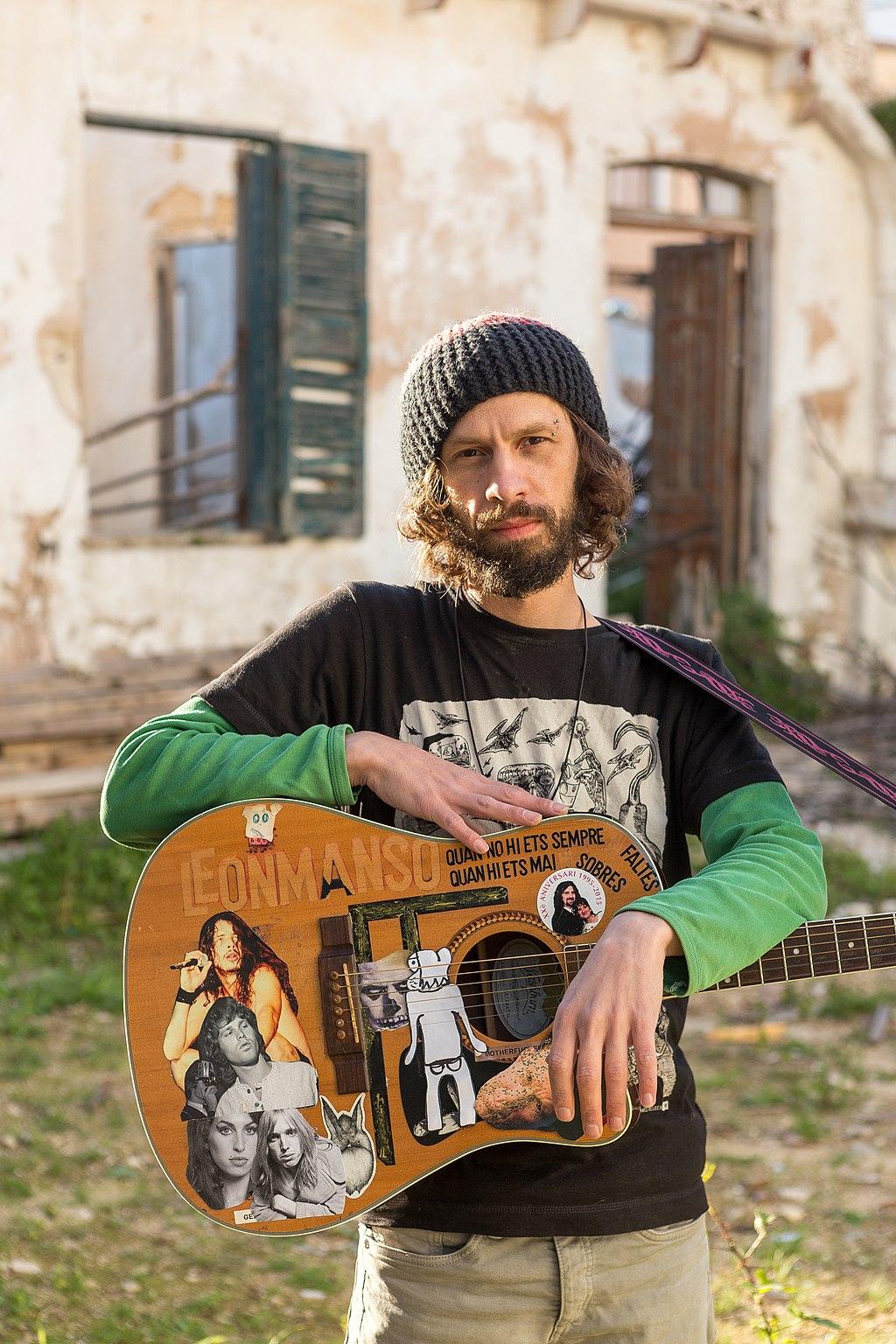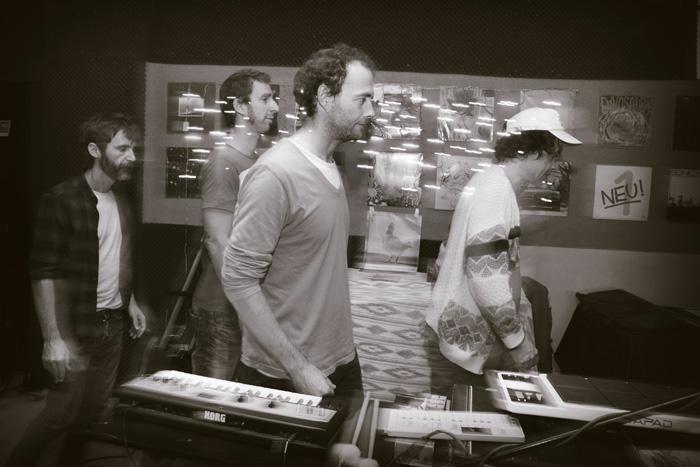The stage lights were shut off. We heard footsteps and, in the darkness, we glimpsed the silhouette of a woman coming towards us, the audience, reciting a poem:
“Paradís que s’ha inundat.
S’avió vola i tancam segles d’història.
Estic perduda i no tenc mapes.
Es veïnat compta els doblers i canta que no vegis”.
‘A flooded paradise.
The plane flies and we close centuries of history.
I’m lost without a map.
The neighbours count their money and sing their hearts out’
It was Joana Gomila, reciting that poem of hers while she carried a big, bulky thing in her hands. It was a pine tree. A pine tree! A young Mediterranean pine in a plant pot. We would find out later that the pine was called Pitus. The Mallorcan singer-songwriter continued to recite the poem, as though that great tree didn’t weigh eight kilos:
El món prodigiós, qui se’l va inventar?
Els déus del silenci ja arriben, fan tard
Esferes són plenes d’humans continguts
Refugis, antenes, illots ben perduts.
‘The prodigious world, who invented it?
The gods of silence are coming,
they’re late Spheres are full of contained humans Shelters,
aerials, faraway islands’
This scene might seem like a visual metaphor to introduce a deep-rooted, traditional folk performance. The stage for the concert was indeed the Centre d'Art Tradicionàrius. But seconds later, Joana’s voice was disfigured by all sorts of sound effects. As though her body were a channel of expression for thousands of robots from all over the galaxy.
“Són cercles i segles
cercant es sentit
es fred dels estels
fa els humans ben petits”.
‘Circles and centuries
looking for meaning
the cold of the stars
makes humans tiny’
Mediterranean pines and robotic voices coexist in the songs of this elusive singer-songwriter, who came into the spotlight in 2016 with ‘Folk souvenir’. That disc features ‘Cançó des desbarats’ (‘Nonsense Song’), a cover of ‘Holidays’ by Antònia Font. Joana pulled and pulled on the thread of that song from the ‘Taxi’ album, then wove it together again with a radically new look. Joana is also a futurist, and has a bright future ahead of her. A future beginning just at the end of the story of Antònia Font, the band that revolutionised pop music from the Balearic Islands.

Joana Gomila.
The Mallorcan quintet disappeared in 2013, leaving us with three key legacies. First, a discography that acts as a treasure map, capturing the imagination of everyone who wants to decipher it. Second, a path we can follow through guitarist and songwriter Joan Miquel Oliver’s solo albums and keyboard player Jaume Manresa’s productions. And third, and most importantly, a landing strip perfectly equipped to welcome tourists from any corner of the galaxy. Aliens that offer sounds and suggestions of all kinds to any Balearic musician that approaches them.
Planes, boats, telescopes
In the ’60s, Balearic groups like Els Mallorquins, The Four Winds and Dito, Los 5 del Este and Los Beta were already feeding off the electric sounds arriving on the islands in the first planes full of tourists. In the ’80s, singer-songwriter Maria del Mar Bonet embarked on the opposite journey: setting sail from the island, she began her odyssey as an explorer of the sounds of the Mediterranean. But it was Antònia Font who set up the Galactic Pop Observatory. With them, the telescope became an essential item.
The group’s curiosity for faraway or parallel universes, and their desire, or even need, to connect them to the strange island ecosystem is the poetic and musical point of departure for journeys like those of Joana Gomila, Leonmanso, and Miquel Serra, among others. These artists all took creative flight just when the quintet, which included Oliver and the Debon brothers, were taking their final steps. They are artists on that path towards a ‘universal’ Balearic pop in the most literal sense of the word. With their feet on the ground and their head in the stars.

Leonmanso
‘You haven’t seen it all, you haven’t seen it all / Leave the fish bowl and keep travelling the world’, sings Menorcan Leonmanso, who has been lauded by Joan Miquel Oliver, in ‘Una gota d’aigua pura’ (‘A Drop of Pure Water’). Apparently, this drop of pure water is a tear with which the singer-songwriter bid farewell to Amy Winehouse. ‘A Russian moon comes up / Over the girls and the winter allotment / Evening of so many springs / Nothing wakes them up, the kind air tenses up a little’, sings Mallorcan Miquel Serra in ‘Radiolaris’. Animal Collective’s stamp has disappeared bit by bit from his music, but this profoundly emotive, surreal poetry remains.
More could be named, of course, but this holy Balearic trinity made up of Joana Gomila, Leonmanso and Miquel Serra – these three visionary yet down-to-earth voices, who move within ultra-local yet cosmic parameters, who express themselves with poetry that is intimate and frenzied, playful and irreverent – maybe wouldn’t have progressed as confidently as they have over recent years if, before them, Antònia Font hadn’t shattered all assumptions as to what a song made on the Balearic Islands could and couldn’t be.
Local music in the local language
We could talk about the Africanist pop of Zulu Zulu, heirs of the fabulous Oliva Trencada, who would put the work of nineteenth-century Mallorcan poet Maria Antònia Salvà to music one day, and tell the story of a kestrel finding work at Palma Airport through a temporary job centre the next. Or about Jorra i Gomorra, from Manacor, who despite playing a distinctly anglophone style of indie rock, never sang in English, unlike ’90s Mallorcan indie bands like Sexy Sadie and Los Valendas. The same must be said of Da Souza, another group that sang in Catalan from the very beginning. Thanks to this linguistic decision, they have treated us to songs like ‘Migracions de salmons’ (‘Salmon Migrations’), a track of the same quality as some of Teenage Fanclub’s best hits.

Miquel Serra.
The catalogue put out by Mallorcan label Bubota Discos is an ode to ‘local music in the local language’ and a good starting point for diving into current Balearic music, from the otherworldly F/E/A to the electric Saïm. The Estudis Favela label led by Pep Toni Ferrer, the singer from Oliva Trencada and Zulu Zulu, is another key epicentre; indeed, Ferrer produced a good handful of the Balearic albums that have come out in recent years. We could continue with Xanguito, from Bunyola, who once worked with Antònia Font singer Pau Debon and who, surprise surprise, have named their latest album ‘Milions d’estrelles’ (‘Millions of Stars’). Or with Vers Endins, a poetic, lively band that has already made links with Joana Gomila. Or with the intimate, cosmic ‘Las mil voces de mi cuerpo’ (‘My Body’s Thousand Voices’) by Maó native Anna Ferrer.
Who would have thought young singer-songwriters like Anna Ferrer and Joana Gomila could remind us of Maria del Mar Bonet and Laurie Anderson! To plunge into Balearic music today is to set off on a fascinating journey around an internal galaxy. It is to plant a young pine tree on the stage before going to wander other universes. But here, it is all part of the same sequence. Balearic pop music is changing its appearance, not its intention. It is still deeply rooted in its Mediterranean soil. But Antònia Font helped to cultivate it, so that it could grow up through the stratosphere and live among the asteroids.














